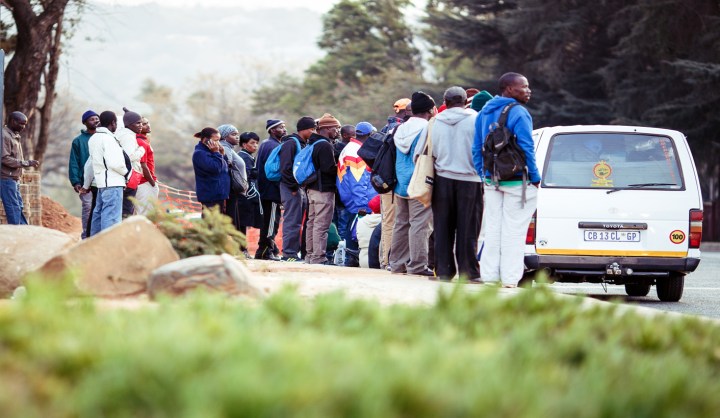South Africa
Route Shutdown: No Taxi to (0r out of) Soweto

It’s been two weeks since Gauteng MEC for Roads and Transport, Ismail Vadi, announced the month-long shutdown of five taxi ranks and several routes in Soweto. There’s no mistaking the impact of the shutdown on commuters, BHEKI C. SIMELANE discovered.
It should have been a simple journey. Thirty minutes and 18.4km later and I should have arrived in the Johannesburg city centre from Dube Soweto.
Except it wasn’t.
It’s been two weeks since Gauteng MEC for Roads and Transport, Ismail Vadi, announced the month-long shutdown of five taxi ranks and several routes in Soweto. This followed ongoing violence between two rival taxi associations –the Nancefield-Dube West Association (Nanduwe) and the Wits Taxi Association (Wata) – that have failed to find resolutions to fights over routes, particularly those around the Rockville and Dube areas.
There’s no mistaking the impact of the shutdown – a 30-minute journey took three hours and 13.4km of walking before this reporter got to a point where a taxi to Johannesburg via Lenasia could be caught.
For daily commuters, the impact is being felt physically, financially and in the time spent travelling.
Getting to and from Soweto to Joburg before the shutdown would normally cost R36 for a round trip using one taxi there and another back. Now the same trip costs more than double, requires the use of eight taxis in total and can take several hours .
“They forgot about us commuters, they always do once they start with their fights. The taxi bans are hitting us where it hurts most – in the pocket. I’m paying almost three times more to get to work, and travel longer to get there. I sell food in Lenasia. Normally I take a taxi to Bara, get off at Chris Hani Road and take one to Lenasia. It used to be a 40-minute journey, but now I spend over an hour on the road. Many taxi drivers are also my customers, I’m losing money because of their absence,” Oliver Sacolo, 54, says.
The threat of violence hangs thick in the air. “You don’t want to catch a lift in front of these taxi guys because all hell will break loose,” warns an elderly woman selling roasted mielies.
Taxis form the backbone of South Africa’s public transport system with the South African National Taxi council estimating that the R40-billion taxi industry employs more than 600,000 people and transports 15-million commuters per day in some 300,000 vehicles, the majority of which are located in Gauteng.
But it is one of the most unregulated industries in the country with several government attempts to regulate it limping along with little success.
The fights over routes in the affected Soweto area have already led to the deaths of several taxi drivers and injuries to passengers caught in the crossfire. Police are reluctant to give specifics but say they are investigating several cases.
At stake is the operational rights to the routes affected by the shutdown. A court order granted to Nanduwa prevents Wata from operating on the routes but this was ignored, resulting in the provincial transport department shutting them down.
The affected ranks and routes are Mofolo Kwa-Mthethwa Informal Taxi Rank; Makhetha Stores Informal Taxi Rank; Dube Station Taxi Rank; Makhetha Garage (Phefeni) Taxi Rank, and Uncle Tom’s Taxi Rank.
“Imagine you have laws that say others taxis should make money while others shouldn’t. The taxi industry is being run worse than a shebeen with multiple owners. Laws are applied arbitrarily because the government think they are dealing with illiterates. This can’t be right. Who must starve? Taxis still need to be paid off but they arrest us when we get back on the road. These taxis must be paid off, we can’t afford being idle. There is too much rot in this industry too,” taxi driver, Mfundisi Nzama, 42, says.
So far 13 drivers have been arrested after attempting to open SofaSonke Rank – one of the shut ranks – serving residents from Zola, Dube, and nearby areas. In addition, police have impounded 15 taxis and confiscated at least four firearms since the shutdown began.
Despite the impact on travel times and costs some commuters believe government had no option but to shut down the ranks.
“Authorities were right to shut down the ranks. How many more people were supposed to die before this is acted on? The interested parties, including passengers, should find a quick solution. It’s a necessary step that requires authorities to be firm. We cannot all be bullied by the taxi industry. I hardly get to work on time but I’m not too bothered because I know this is necessary,” Lwazi Kaduna, 39, said.
Talks between the two associations and government are still ongoing and members of the South African Police Service and Johannesburg Metro Police remain on the scene.
In the meantime, commuters will have to continue to dig into their pockets for their daily commutes, at least for the next two weeks and maybe longer. DM
Photo: Commuters bear the brunt of ongoing turf wars over routes, which means longer queues. Rafiq Sarlie

















 Become an Insider
Become an Insider